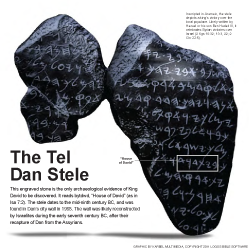10:1–17 Chapter 10 continues the narrative of Jehu’s overthrow of the house of Ahab (9:1–10:27). In vv. 1–17, all who have a rightful claim to the throne—along with government officials, priests, and family friends—are slaughtered. |
10:1 seventy sons Likely a symbolic number that refers to all of Ahab’s remaining descendants. Abdon also had 70 descendants (Judg 12:13–14); Abimelech killed his 70 brothers before establishing himself as king (Judg 9:5).
Samaria Capital of the northern kingdom of Israel. See 2 Kings 1:3 and note.
10:4 two kings Refers to Joram of Israel and Ahaziah of Judah, whom Jehu assassinated (9:14–28).
10:6 the heads of the men of the sons of your master The Hebrew phrase used here seems to be intentionally ambiguous. Jehu’s request could be construed as asking for the leaders to bring the guardians of Ahab’s sons (mentioned in vv. 1, 6) and come to Jezreel. However, his request could also be construed as asking them to murder Ahab’s descendants. Jehu clearly expected them to take the latter sense (v. 8), but the ambiguity allows him to distance himself from the act itself (v. 9).
at Jezreel The place where Jehu had just killed King Joram, King Ahaziah, and Jezebel (9:21–33; see note on 9:21); located about 25 miles (40 kilometers) from Samaria.
10:7 seventy men The city leaders interpret Jehu’s letter as a command to decapitate Ahab’s descendants.
10:8 at the entrance of the gate until morning In the ancient Near East, displaying an enemy’s body or body parts in plain view was a common way to intimidate citizens into cooperating.
10:9 who killed all of these? Although Jehu’s lack of astonishment in v. 8 suggests that he anticipated the decapitations, his remark here to all the people again leaves room for ambiguity (see note on v. 6).
10:10 by the hand of his servant Elijah The prophet Elijah had cursed the house of Ahab (1 Kgs 21:17–24; 2 Kgs 9:7–10).
10:13 Ahaziah king of Judah Assassinated by Jehu (9:27–28).
the queen The Hebrew word used here, gevirah, meaning “queen mother,” is a formal title, but the function of this office is unclear.
10:15 Jehonadab the son of Recab The book of Jeremiah identifies the Rechabites as an ascetic group that denied themselves any form of comfort or pleasure. They rejected the agricultural lifestyle of the Canaanites and faithfully kept the teachings of Jehonadab, their leader (Jer 35). Given Jehu’s mission to wipe out the prophets of the Canaanite god Baal (2 Kgs 10:18–27), Jehu’s partnership with Jehonadab makes sense.
10:17 to Samaria Capital of the northern kingdom of Israel. See 1:3 and note.
that he had spoken to Elijah See v. 10 and note.
10:18–27 After killing off the entire house of Ahab, Jehu destroys all traces of Baal-worship in Samaria, which King Ahab and Jezebel promoted (1 Kgs 16:31–33). In the ancient Near East, kings who took the throne in an unusual manner often initiated reform as a way to break with the previous regime. |
10:18 Baal The Canaanite storm god.
 Pagan Deities in the Old Testament Table
Pagan Deities in the Old Testament Table
10:22 the wardrobe The meaning of the Hebrew word here is uncertain. The rendering “wardrobe” is drawn from the context.
10:23 that there is none of the servants of Yahweh Jehu wants to ensure that no servant of Yahweh is accidentally killed along with the worshipers of Baal.
10:25 threw them out The Hebrew term used here refers to leaving a corpse unburied (1 Kgs 13:25; Isa 14:19).
the temple of The Hebrew word ir, meaning “city,” sometimes is rendered as “inner room” or “inner shrine.” This scene clearly takes place inside the temple to Baal (2 Kings 10:21–24). The author probably wanted to avoid using the word devir, which connotes “inner sanctuary” and is associated with the temple of Yahweh in Jerusalem (see 1 Kgs 6:5 and note).
10:29 were in Bethel and Dan Jeroboam erected these idols to rival the temple of Yahweh in Jerusalem (see 1 Kgs 12:25–33 and note; 1 Kgs 12:28 and note).
10:30 all that was in my heart Jehu had done what God desired by killing every male descended from Ahab (1 Kgs 21:21; compare note on Josh 6:16). This is because their regime was fraught with evil (see note on 2 Kgs 8:18).
10:31 the sins of Jeroboam A reference to the synchronistic and idolatrous worship of Jeroboam’s reign. See note on 3:3.
10:32 Hazael Refers to the king of Aram (Syria). Ahaziah, king of Judah, and Joram, king of Israel, had joined forces against Hazael (8:28–29) shortly before Jehu assassinated them (9:21–28). Elisha had prophesied that Hazael would do evil against Israel (8:12).
10:34 the scroll of the events of the days of the kings of Israel See note on 1:18.

|
About Faithlife Study BibleFaithlife Study Bible (FSB) is your guide to the ancient world of the Old and New Testaments, with study notes and articles that draw from a wide range of academic research. FSB helps you learn how to think about interpretation methods and issues so that you can gain a deeper understanding of the text. |
| Copyright |
Copyright 2012 Logos Bible Software. |
| Support Info | fsb |
 Loading…
Loading…


